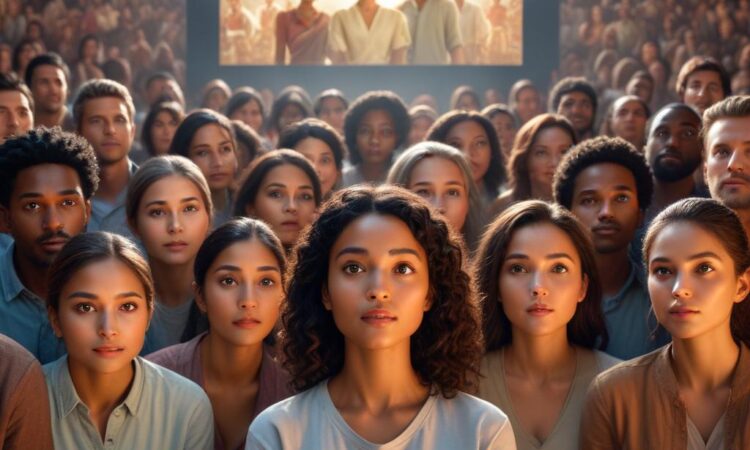The Cultural Significance of Film: A Deep Dive
Film, a powerful medium capable of transporting us to distant lands and immersing us in captivating stories, has profoundly impacted society and culture. It serves as a mirror reflecting our values, beliefs, and perceptions, while also shaping our understanding of the world. This essay explores the cultural significance of film, examining its intricate relationship with society and its profound influence on how we perceive ourselves and the world around us.
Film as a Reflection of Society
From the earliest silent films to the latest blockbuster epics, cinema has consistently mirrored the social, political, and cultural landscape of its time. Films reflect the anxieties, aspirations, and controversies that shape our collective consciousness. For instance, the rise of social realism in the 1930s, depicted in films like \”The Grapes of Wrath\” (1940), mirrored the economic hardships and social injustices faced by Americans during the Great Depression. Similarly, the Civil Rights movement of the 1960s inspired films like \”To Kill a Mockingbird\” (1962) and \”Guess Who’s Coming to Dinner\” (1967), which explored themes of racial prejudice and challenged societal norms.
Films can act as a platform for social commentary, highlighting issues often overlooked or silenced by mainstream media. For example, the groundbreaking film \”The Birth of a Nation\” (1915), while now considered highly controversial for its racist portrayal of African Americans, sparked a national dialogue about race relations in the United States. This film, despite its flaws, exemplified the power of cinema to ignite conversations about sensitive and pressing societal issues.
Furthermore, film serves as a powerful tool for cultural preservation. Through documentaries, historical dramas, and biographical films, we gain insight into the lives, traditions, and struggles of diverse cultures. Films like \”The Godfather\” (1972) and \”Casablanca\” (1942) have become cultural touchstones, reflecting the values and aspirations of specific historical periods and cultures. These films not only entertain but also educate and inspire generations, fostering cultural understanding and appreciation.
Film as a Shaper of Culture
Beyond merely reflecting society, film actively shapes our values, beliefs, and perceptions. The narratives, characters, and themes presented in films influence our understanding of the world and our own place within it. The visual language of film, with its powerful combination of images, sound, and music, can evoke strong emotions and create lasting impressions.
For instance, the portrayal of women in film has evolved over time, mirroring changing societal attitudes towards gender roles. Early films often relegated women to passive roles, serving as damsels in distress or romantic interests. However, the rise of feminist cinema in the 1970s challenged these stereotypes, featuring strong and independent female characters. Films like \”Thelma & Louise\” (1991) and \”Erin Brockovich\” (2000) helped to redefine the portrayal of women in cinema, empowering audiences and challenging gender norms.
Film also has a profound impact on our understanding of other cultures. Through immersive experiences, films transport us to different societies, exposing us to diverse perspectives and lifestyles. Films like \”Slumdog Millionaire\” (2008) and \”Parasite\” (2019) provide insights into the realities of poverty and social inequality in other parts of the world, promoting empathy and understanding between cultures.
Furthermore, film plays a crucial role in shaping our perceptions of beauty, success, and happiness. By presenting idealized versions of reality, films can influence our aspirations and expectations. This can be both beneficial and detrimental, promoting positive values while also perpetuating harmful stereotypes and unrealistic ideals. For example, the portrayal of wealth and luxury in Hollywood films can contribute to a culture of materialism and consumerism.
The Impact of Film on Our Understanding of the World
Film has significantly shaped our understanding of the world, expanding our horizons and deepening our engagement with global issues. Through its powerful narratives, film can shed light on complex historical events, social injustices, and scientific breakthroughs. Documentaries, in particular, have played a vital role in raising awareness about environmental issues, human rights abuses, and political corruption.
Films like \”An Inconvenient Truth\” (2006) and \”The Cove\” (2009) have brought attention to pressing environmental concerns, mobilizing audiences and encouraging action. Similarly, documentaries like \”The Act of Killing\” (2012) and \”Icarus\” (2017) have exposed human rights violations and political scandals, sparking international dialogue and prompting investigations.
Beyond its role in raising awareness, film also fosters empathy and understanding by presenting diverse perspectives on global events. Films like \”The Boy in the Striped Pajamas\” (2008) and \”The Pianist\” (2002) offer poignant portrayals of the Holocaust, prompting reflection on the consequences of hatred and intolerance. By immersing viewers in the experiences of others, film encourages compassion and bridges cultural divides.
The Evolution of Film
Film technology has evolved significantly throughout its history, influencing its form, content, and impact on society. The transition from silent films to talkies revolutionized the medium, introducing sound and dialogue, expanding its expressive capabilities. The advent of color film further enhanced the visual experience, adding another layer of realism and aesthetic appeal.
The development of digital filmmaking in the late 20th and early 21st centuries has revolutionized the industry, making film production more accessible and cost-effective. Digital technologies have also enabled new forms of storytelling, including CGI effects, interactive experiences, and online platforms. This evolution continues to shape the future of film, pushing the boundaries of creativity and expanding its reach.
Conclusion
The cultural significance of film cannot be overstated. As a powerful and influential medium, cinema has mirrored and shaped our values, beliefs, and perceptions, profoundly influencing our understanding of the world. Through its evocative narratives, engaging characters, and insightful portrayals of diverse cultures, film has become an integral part of human experience, fostering empathy, understanding, and a shared sense of humanity.
From its humble beginnings as a novelty to its current status as a global industry, film has continued to evolve, embracing new technologies and adapting to changing social and cultural landscapes. As technology continues to advance and the world becomes increasingly interconnected, film will undoubtedly play an even greater role in shaping our collective consciousness and inspiring generations to come.

